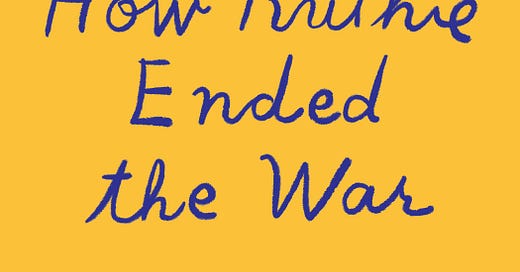Coming Friday: How Ruthie Ended the War
A weekly serialization of the proto-Wildwood story from 2001
In the early months of 2001, Carson and I started working on a book. We were in our mid-twenties, working service industry jobs, and just starting out in our creative careers — we were still trying to figure out what those creative careers might be. I was playing in a band, an early version of The Decemberists, and writing music and short stories. I was biding time, I told myself, till I went back to school for my MFA in creative writing. Carson was painting a lot back then, and picking up the occasional gig doing illustrations for band flyers, indie movie screenings, and literary journals. More than anything, we wanted to collaborate, to embark on something together that married my writing and her illustration, woven from our twin fascinations, whatever that might be.
We decided to work on a story together, one that I’d write and she would illustrate. It would be folktale-inspired, it would be rambly and psychedelic. It would ostensibly be for kids, we supposed, though it didn’t really have any actual audience beyond ourselves. The working title was How Ruthie Ended the War.
I had written about 25,000 words — just about 80 pages, double spaced — and Carson produced a handful of sketches and finished drawings. We had no idea what we were going to do with this story; we had no designs to have it published or even read by anyone, as far as I can remember. We were only making it for the sake of making it. It was something fun to do, together. I learned a lot from the process — I got to play around inside a world built out of our joint fascinations. A lot of the early Decemberists songs, I think, lived in that world, the world of Ruthie. We stopped where we stopped because our attentions got drawn elsewhere. In the end, we wound up printing the whole thing on an 11”x17” poster to hang up around town as part of a protest that an art collective called Red 76 organized when the city of Portland was cracking down on posting bills on utility poles. Such tiny writing; what a weird idea.
Of course, a mere eight years later (God, how time accordions, doesn’t it) we would begin work on the Wildwood Chronicles, a book series which went on to find a worldwide readership, was optioned for an animated film adaptation, and became bestsellers — all this wonderful stuff we couldn’t have possibly imagined happening back in 2001. The bones of that book series can be found in How Ruthie Ended the War — I ended up taking a lot of my favorite ideas from Ruthie and adapting them for Wildwood.
Rummaging around in old writing files the other day, I came across the Word document of Ruthie; I got caught up in reading it. I thought it was a funny and interesting time capsule, if nothing else. It occurred to me that it might be cool to clean it up a bit and serialize it, here, on the Machine Shop. I figure if you frequent this newsletter/blog, it might be of interest to you.
So, starting this Friday, January 12, I’m going to start posting weekly installments of How Ruthie Ended the War. I’ll make it available to all subscribers every Friday morning until it ends. I’m going to do some light editing; I think I’ll mostly keep it intact. I feel like I’ve come a long way as a writer — some of the stuff in it reeks of patterns and proclivities that I’ve long ago put to bed. Astute (or even not-so-astute) Wildwood readers will certainly recognize the elements that made their way into the Wildwood Chronicles. It all ends mid-sentence on that 78th page; I’ll decide what to do with the whole thing when that comes along. Maybe I’ll try to bring it in for a landing — maybe I’ll continue it — who knows. In any case, I hope you enjoy it. See you Friday!










FYI Ruthie's last name is "Baumbaum," for reasons I cannot for the life of me remember or fathom, but I'm keeping it.
Mini book like The Grevious Ddmise of Mr. Whitley Rackham????